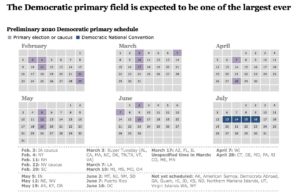The Good and The Bad of New Hampshire’s First in the Nation Primary
By: Mason Martin, July 17th, 2019
Since 1920, New Hampshire has held the first presidential primary election in the nation. In fact, this tradition isn’t due to societal outcry or sheer happenstance, but is instead actually written into law. As stated under New Hampshire law, the New Hampshire presidential primary elections are to be held on either the second Tuesday in March, or at least one week before the earliest primary election (excluding New Hampshire’s).
New Hampshire’s first in the nation status holds an amazing advantage for Granite State voters, as this

(Photo Credit: National Journal)
status ensures that they’ll be able to cast their vote free of influence from any elections held prior to theirs. For example, voters in Michigan have already had to sit by and watch as the Iowa caucuses, New Hampshire primaries, and Super Tuesday, among others have already come and gone. By the time that their turn to vote comes around, twenty-one primaries and caucuses have already been held for Democratic voters, and seventeen for Republicans, meaning that by this point the upper-echelon of candidates in each party has likely began to emerge, and separate themselves from the rest of the crowd- meaning that supporters of candidates who aren’t doing so well may feel hesitant to vote for who they believe in, due to fear of wasting their vote on a candidate who doesn’t have much of a chance left. New Hampshire voters, always very serious about their politics, are free from this burden, as they are the ones who kick off the primary elections- and who also hold the power to make or break entire campaigns. 

While people in New Hampshire definitely enjoy their first in the nation status, that sentiment doesn’t seem to hold true across the rest of the nation. One of the largest issues with the Granite State holding so much power is their lack of diversity compared to the rest of the nation. According the data from Wolfram Alpha, New Hampshire is 93.7% white, compared to only 73.3%, the percentage of the United States that is white. The issue here becomes apparent when looking at some voting results from the 2016 Presidential election, where Donald Trump won over the majority of the white vote (57% compared to 37% for Hillary Clinton), while Clinton dominated the voting amongst minorities- taking 89% of the African American vote compared to Trump’s 8%, 66% of the Hispanic vote compared to Trump’s 28%, and 65% of the Asian vote compared to Trump’s 27%, according to data from the Roper Center. New Hampshire’s population is also only about 1.4 million, compared to 327 million, leaving a lot of power in the hands of a remarkably small portion of the country- especially considering that according to the New York Times, only about 535,000 people voted in the New Hampshire primaries in 2016, compared to 57.6 million people nationwide (only 28.5% of estimated eligible voters), according to the Pew Research Center. Putting so much importance on a primary that is almost completely void of any diversity, and that also clearly has a noticeable slant towards one side starts to bring the ethics of New Hampshire’s first in the nation status into question, as it can begin killing campaigns early that may have had more of a chance if the primaries started In more
diverse states.
All in all, primary season is creeping closer and closer, and this year’s election is bound to be as explosive as ever, which is why we must get the big decisions like this right. With a primary field as crowded as it is this year, the margin for error is significantly smaller than usual- which is why New Hampshire must love to be able to vote free of the influence of other elections, and also why lots of people across the nation are calling for the primaries to start in more diverse, populated states to make sure that everyone’s voices are heard. While the Granite State will likely never budge on it’s placement in the primaries, it’s important to ask ourselves if this is right, and if this is fair- and if it’s not, it’s important for people to speak out and start fighting to make a change. The fate of the primaries, the election, and the course of American history may just depend on it.

Socialize